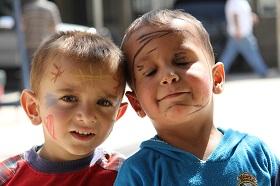Using AI to control energy for indoor agriculture
30 September 2024
Published online 10 April 2013

Activists and charity workers have highlighted the hazards confronting Syrian refugees crowding into Lebanon as civil war rages in their homeland. Two years after the uprising against Bashar al-Assad's regime began, those who have fled the violence are still vulnerable and at grave risk of becoming ill in overcrowded camps or cramped housing.
Advocates for the refugees say that limited access to healthcare and expensive medications compound the perils of exposure to communicable disease – even more dangerous for a high proportion of children who have not been given basic immunisation.
"Healthcare is particularly expensive [in Lebanon]," says Ramy Sleiman, a Syrian activist in Lebanon. "In Syria you may only pay US$200 for an entire operation but that gets you very little in Lebanon. There are organizations that are trying to help people but they can't cover all costs."
Displacement always disproportionally affects the most vulnerable members of the population, including the elderly, pregnant women and children. Médecins Sans Frontières (MSF), one NGO working to help the displaced, found that exposure to the cold through inadequate housing means respiratory infections are rife and a paucity of hygiene facilities is leading to skin conditions like scabies and lice.
As families crowd into one-room apartments and temporary shelters, the risk of communicable diseases increases significantly, especially among unvaccinated children. A MSF survey1 conducted in 2012 and recently published found that only 32.6% of refugee children have been vaccinated against some of the most common diseases such as tetanus, polio, measles and others that are part of MSF's normal vaccination package.
The mental health of the displaced is also affected. "Children went through many traumatic experiences; there was always explosions and gunfire, and then they come here with nothing and live in a one-room apartment with four families," explains Hussein Dimaci, the manager of the organization From People to People in the Palestinian refugee camp of Sabra, one of the many places where Syrians have sought refuge. The camps were already unsafe for the original numbers, let alone for the large influx from Syria, he adds.
There are organizations that are trying to help people but they can't cover all costs.
"We don't believe this is a humanitarian crisis that is going to end any time soon," says Fabio Forgione, MSF's head of mission in Lebanon. "There are 40,000 refugees coming per month."
Official numbers of refugees in Lebanon were nearly 400,000 at the end of March, but the actual figure may be at least double that. Forgione referred to a statement from the Lebanese minister of interior that estimated the number of refugees at 900,000 – straining the country's capacity to provide a safe haven.
According to the MSF study, registration with the United Nations appeared to improve a refugee's access to healthcare. Registered refugees reported they had greater access to all five types of health services assessed by the survey: free medication, primary and secondary care, hospitalization, and child vaccinations.
Health conditions considered by the MSF survey varied across Lebanon. In Tripoli, where many aid organizations operate, 70% of refugees had registered with the UN and 48% reported to have adequate access to help. But in the coastal city of Sidon, only 37% were registered and 9% said they received enough assistance.
Besides direct medical aid like vaccinations and doctors' treatment, registration with the UN gives access to help from non-medical organizations like Save the Children, which provide "hygiene kits" that include cleaning supplies and toiletries. But healthcare remains expensive, and nine out of ten interviewees in the MSF survey said the price of prescription drugs in Lebanon was the main barrier to health care.
The report contends that more than half of respondents said they could not afford to buy medication in Lebanon, a number that seems likely to rise given the steady stream of new arrivals and the dearth of opportunities for refugees to earn an income in their temporary and tenuous circumstances.
doi:10.1038/nmiddleeast.2013.54
Stay connected: